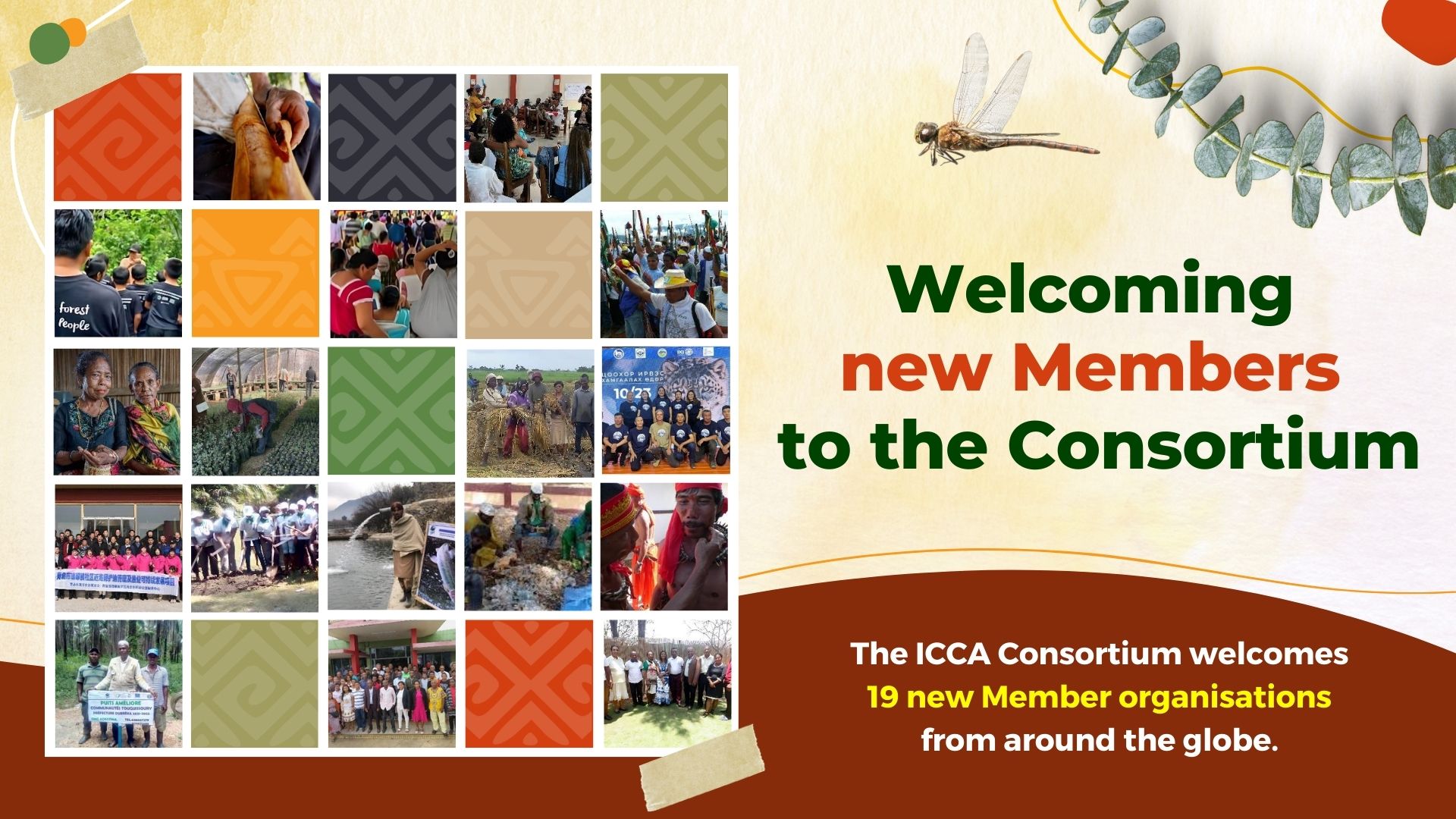The ICCA Consortium welcomes 19 new Member organisations from around the globe
First published on 09/23/2024, and last updated on 09/24/2024
By Xaviera Elorza, Administration and Membership Coordinator, ICCA Consortium
The ICCA Consortium Membership Committee is pleased to announce our newest Members! The following organisations have joined the membership through the first review/intake round in early 2024. In light of our ongoing process of organisational reflection, revisioning and strategic planning, the 2023 General Assembly decided to temporarily pause consideration of new Honorary member nominations until the second round of membership intake of 2024.
19 new Members from Afghanistan, Belize (2), China, Colombia, Costa Rica, Guinea (4), Madagascar (2), Malaysia, Mexico, Morocco, Mongolia, the Philippines, Timor Leste and Togo.
LATIN AMERICA
Mesoamerica
Estudios Rurales y Asesoría Campesina (ERA)
Country: Mexico
Type: Civil society organisation – local/national/international
Ecosystem: Terrestrial (Forest)
ERA’s mission is to collaborate with Indigenous and rural communities living in the Mexican countryside and to strengthen their capacities through the creation of suitable organisational structures, training for the preservation and restoration of the dynamic ecological balance and the exchange of ideas among peers to improve their living conditions through the sustainable use of their natural resources. ERA also supports the development of technical tables for the delimitation of areas under community protection, advocacy before public opinion and government authorities for the respect of the areas constituted as territories protected by Indigenous and rural communities, as well as carrying out science-based analyses to understand the effect that community conservation areas have on the protection of biocultural diversity.
Recommended by Red temática de patrimonio biocultural, ICCA Consortium Member
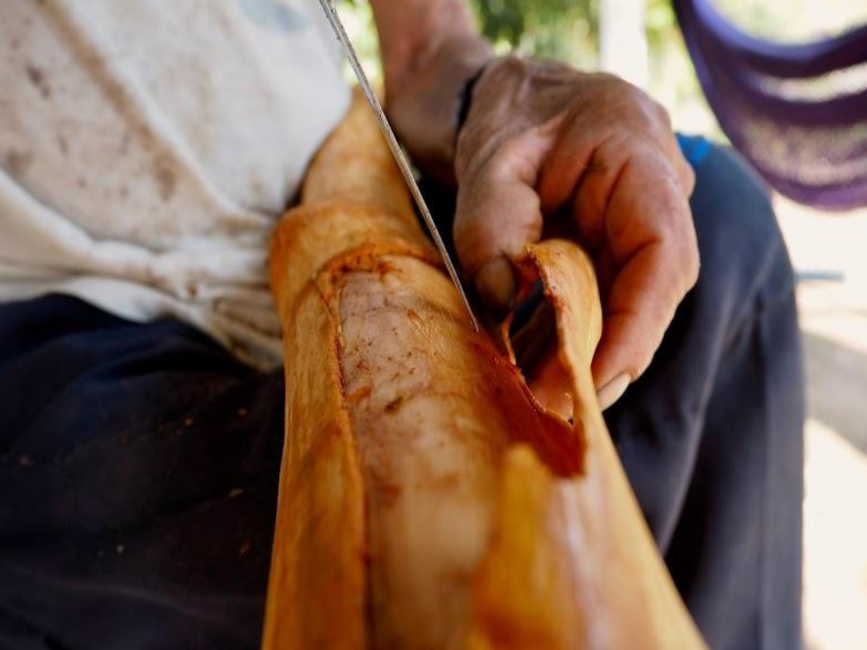
A cinnamon producer obtains the bark for drying and sale © ERA
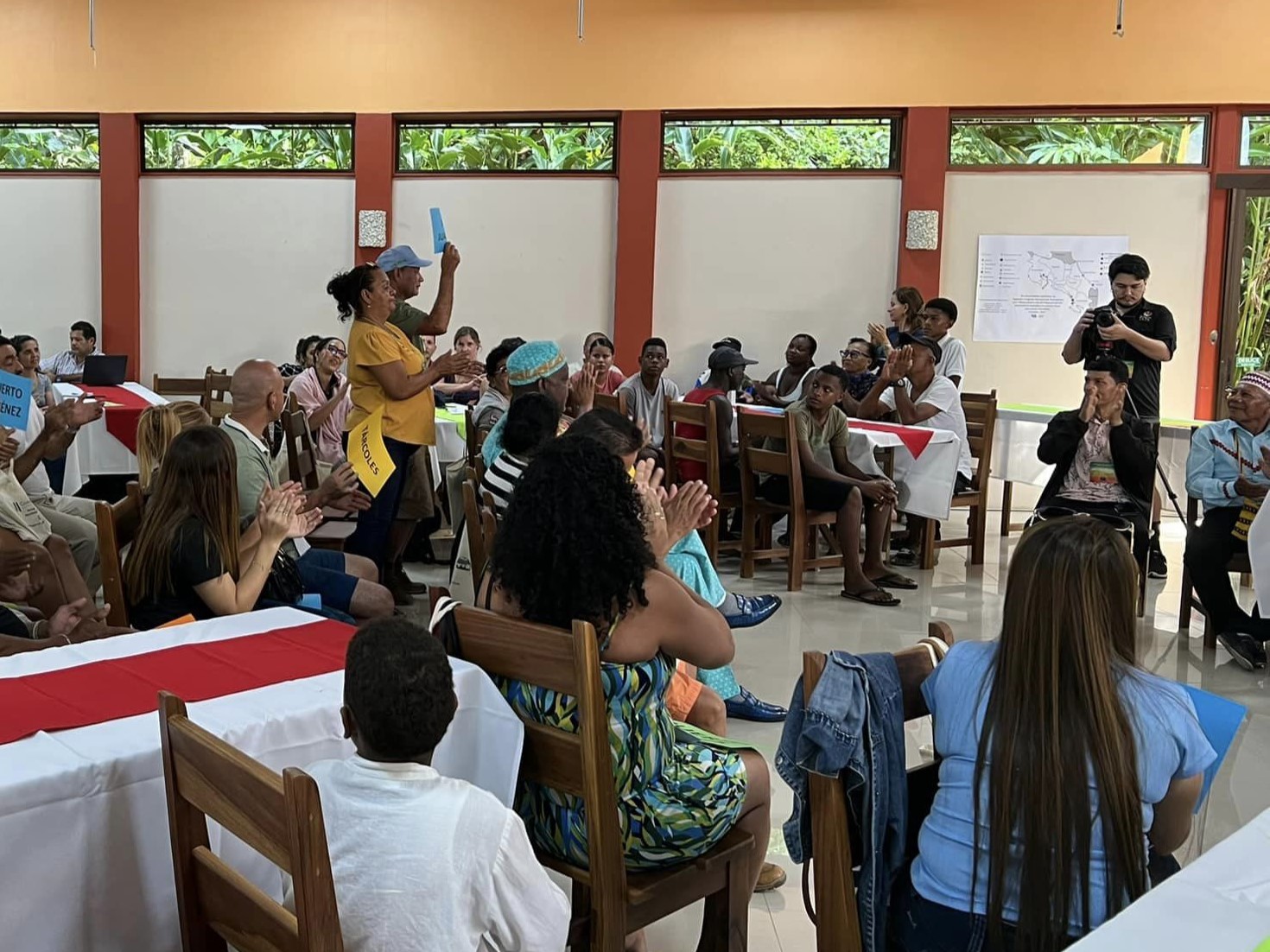
Third congress of the network © Red de áreas marinas de pesca responsable y territorios marinos de vida de Costa Rica
Red de Áreas Marinas de Pesca Responsable y Territorios Marinos de
Vida – Costa Rica
Country: Costa Rica
Type: National network – local/national/regional/international
Ecosystem: Terrestrial, Marine
Its aim is to work in accordance with the FAO’s Voluntary Guidelines for Securing Sustainable Small-Scale Fisheries in the Context of Food Security and Poverty Eradication, and to advance in the fulfilment of rights, from a self-managed, responsible perspective, committed to human development and the sustainable and equitable use of the sea’s resources. It is currently made up of 24 small-scale artisanal fishing organisations located on the Pacific and Caribbean coasts of Costa Rica. The accompaniment of the network has allowed several organisations to strengthen their capacities and their positioning in the push for a public policy that responds directly to the needs and rights of the sector.
Recommended by CoopeSoliDar,
ICCA Consortium Member
Julian Cho Society
Country: Belize
Type: Civil Society Organisation – local/national
Ecosystem: Terrestrial (Tropical rainforest)
The organisation aims to carry forward the legacy of Julian Armando Cho, a Mopan Maya school teacher who began the Indigenous land rights movement in southern Belize in response to increasing threats from logging and oil concessions. Along with its community partner organisations, the Julian Choo Society it advocates for human rights with emphasis to the struggle for justice, democracy, and sustainable development for Indigenous Peoples. It has supported the historical and ongoing efforts of the Maya People of southern Belize to ensure and benefit from stronger tenure security over their traditional lands and resources, allowing them to sustain their forest cover. Some milestone achievements include securing legally affirmed rights to ancestral lands, sustaining robust Maya systems of governance and land institutions and negotiation of a free, prior and informed consent protocol for the Maya in southern Belize.
Recommended by U YICH LU’UM,
ICCA Consortium Member
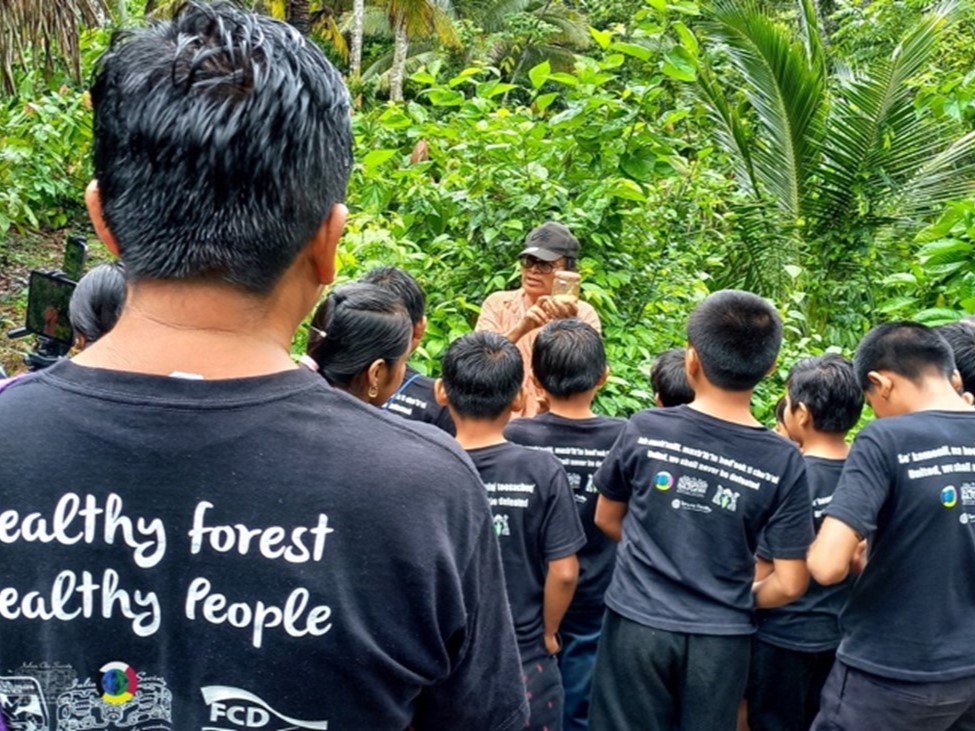
Primary school students on a field trip to learn about agroforestry © Julian Cho Society
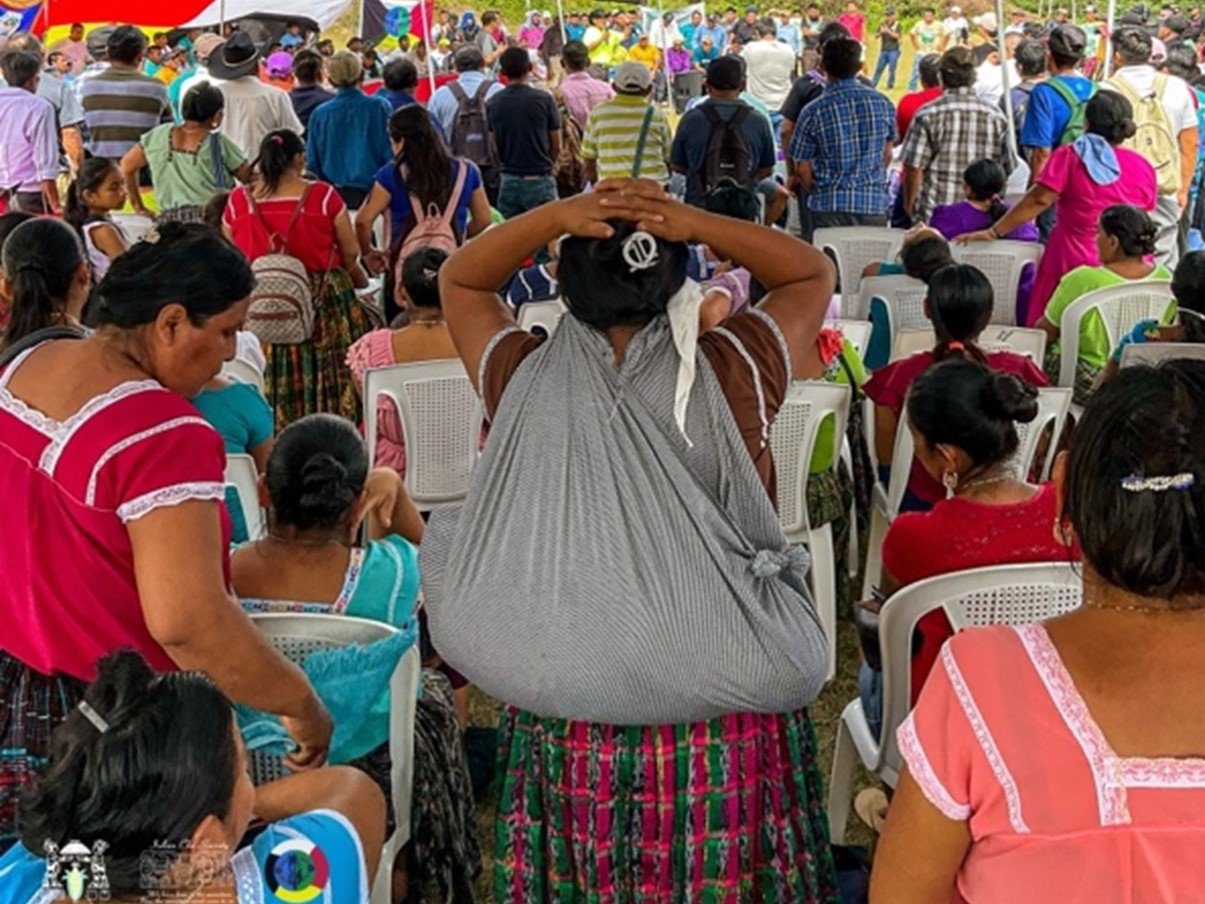
Maya women participate in a gathering of the association © Toledo Alcaldes Association
Toledo Alcaldes Association
Country: Belize
Type: Indigenous association
Ecosystem: Terrestrial (Tropical rainforest)
The Toledo Alcaldes Association’s membership consists of 80 traditional leaders from 40 Maya communities and is the main representative body and highest central authority of the Maya People in southern Belize, considered the custodian and protector of Maya customary law and practice. As a sui generis and quasi-governmental organisation, composed of duly elected traditional leaders, it provides a space for the Maya People to foster their collective visioning, synergy of efforts, and concerted holistic approach to pursuing their long-term aspirations. Its current priority is to strengthen the management of their lands and do so by developing life plans so that they can be “healthy forest, healthy lands, and healthy Maya communities”. The Toledo Alcaldes Association (TAA) is the community partner organisation of Julian Cho Society
Recommended by U YICH LU’UM,
ICCA Consortium Member
The Amazon
Unidad Indígena del Pueblo Awá (UNIPA)
Country: Colombia
Type: Indigenous organisation
Ecosystem: Terrestrial (Humid tropical forest)
UNIPA is made up of 29 Awá Indigenous resguardos and 4 ancestral territories located in the southwest of Colombia. These resguardos extend over 220,000 hectares of tropical rainforest and are home to around 23,000 Awá individuals. Their mission is to materialise the right to selfdetermination as an ancestral People, to preserve their cultural identity and to promote the defence of the Katsa Su – large territory – in its entirety, through the exercise of their own authority and justice that facilitates the participation of men and women on equal terms. With more than three decades of experience, UNIPA has a strategic vision, focused on being a strengthened Indigenous Awá People, with its own thinking, that coexists under principles of unity, territory, autonomy, culture and identity with nature, with other Peoples and other sectors of society.
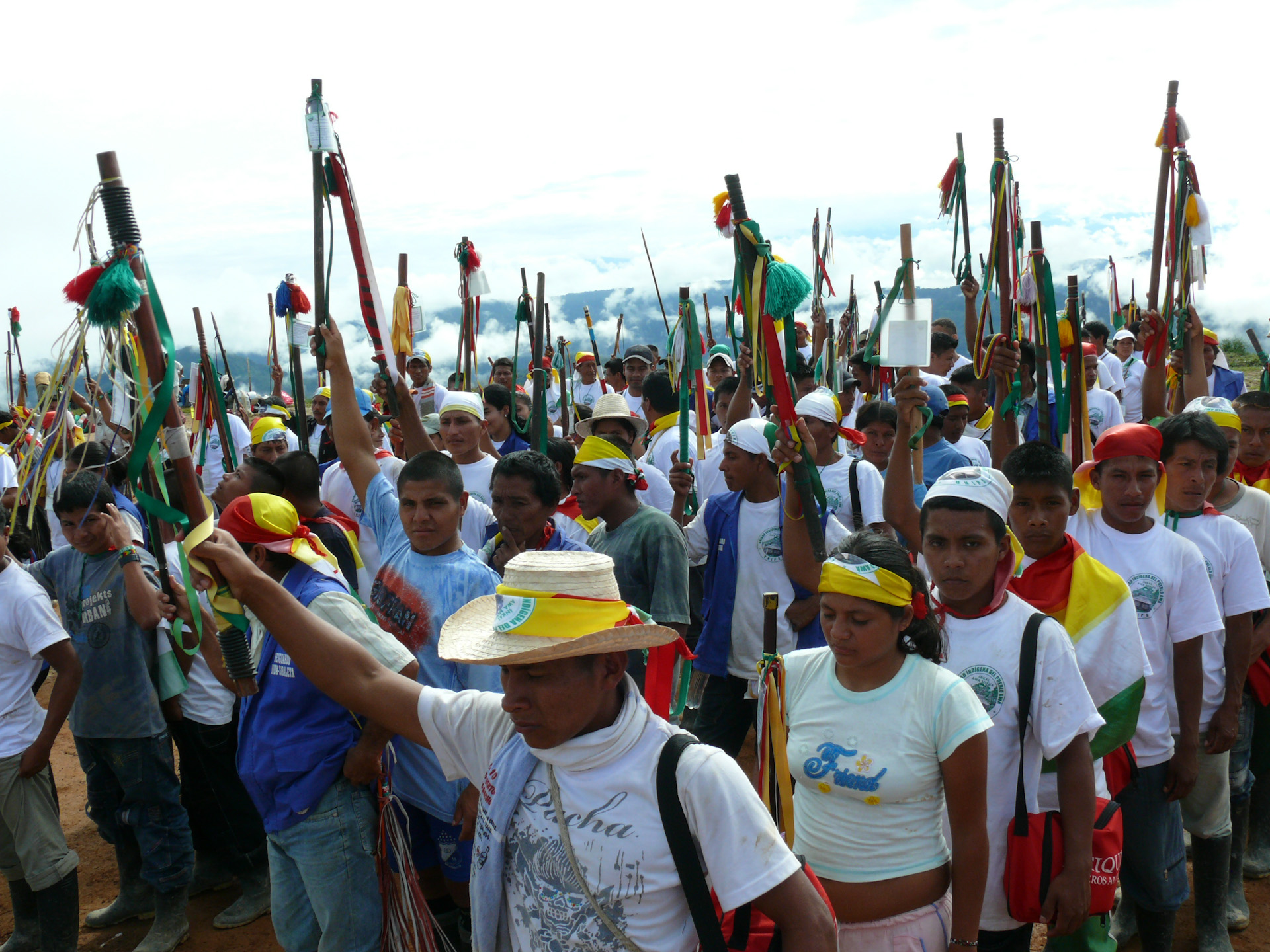
Minga (community gathering) for life and dignity, the Unidad Indígena del Pueblo Awá defends life and the territory © UNIPA
AFRICA
North Africa
Association ASKA pour la femme et l’enfant
Country: Morocco
Type: Local association – local/national
Ecosystem: Terrestrial (Forest, mountain)
Since 2013, Association ASKA has been working to improve the incomes and living conditions of the local population by supporting them in implementing initiatives for the sustainable management of natural resources, biodiversity conservation and adaptation to the effects of climate change in the territorial commune of Ait Mhamed (central high Atlas area), province of Azilal. Key activities include documenting customary rules and local knowledge in Ait Mhamed, documenting and characterising the territory, monitoring the process of reporting it to the ICCA Registry and strengthening the governance structures of local communities.
Recommended by Moroccan Biodiversity & Livelihoods Association (MBLA), ICCA Consortium Member
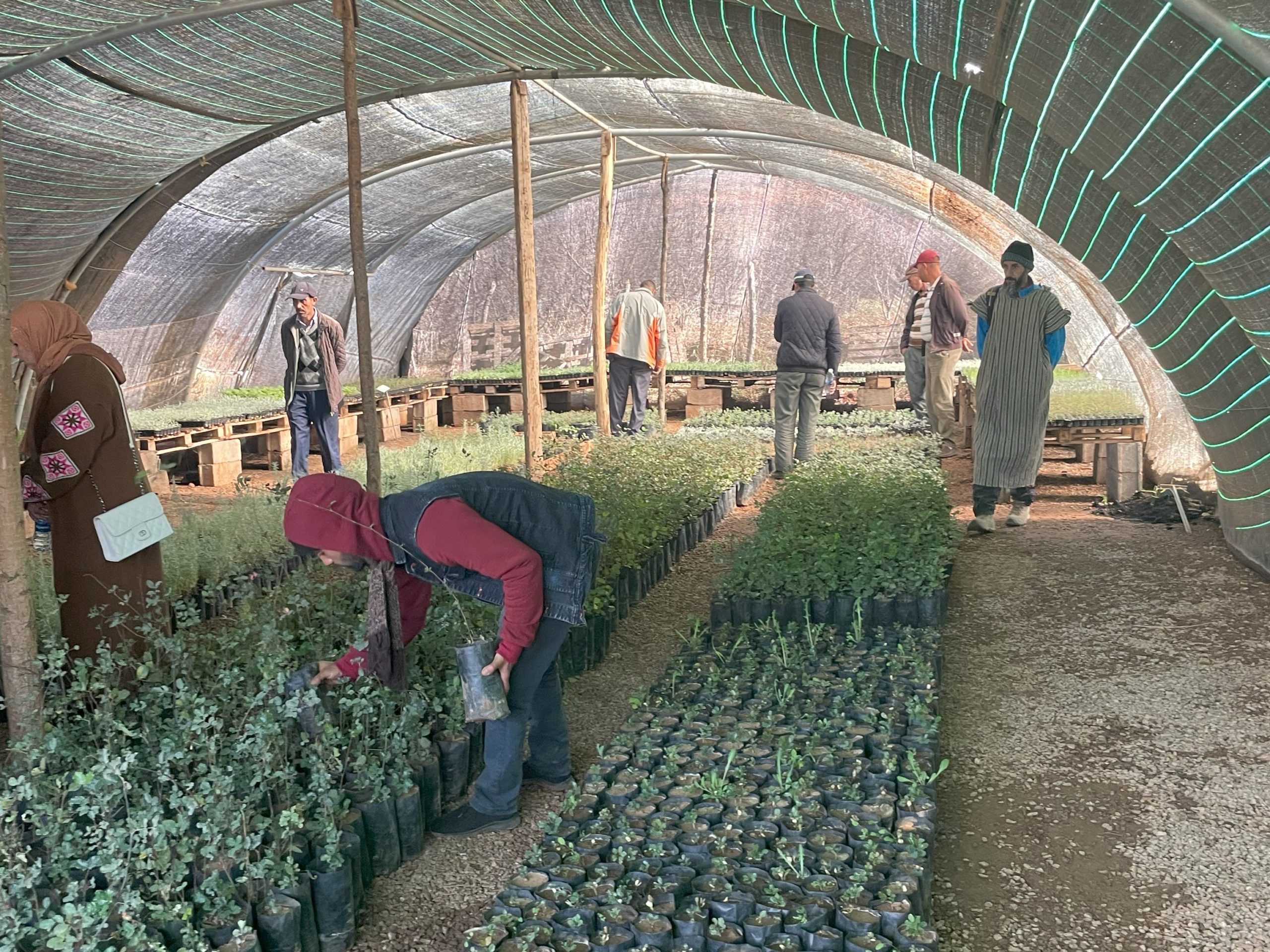
Encouragement and support for local development initiatives aimed at meeting the needs of rural women and motivating them to contribute to improving their material and non-material conditions © Soufiane M’Sou
West Africa
Welfare Togo
Country: Togo
Type: Youth- and women-led civil society organisation – national
Ecosystem: Multiple. Special programme on Sacred Forests
Strongly believing in the importance of conserving land pertaining to Indigenous Peoples and local communities whether for spiritual wellbeing or economic development, Welfare Togo works with Indigenous communities of the Kotokoli and Kabye ethnic groups and has initiated several projects aimed at addressing different threats being faced in the country. One of the key projects involved the inventory and documentation of sites under extreme danger and their protection from further degradation by involving traditional chiefs, local government authorities, traditional medicine practitioners and general public. Other projects were targeted to capacity building for sustainable agriculture and livestock husbandry and, very importantly, to document human rights abuses against communities that stood up against private and public projects threatening their ancestral land and physical safety.
Recommended by Fondation FIDEPE,
ICCA Consortium Member

Harvesting rice
© Welfare Togo
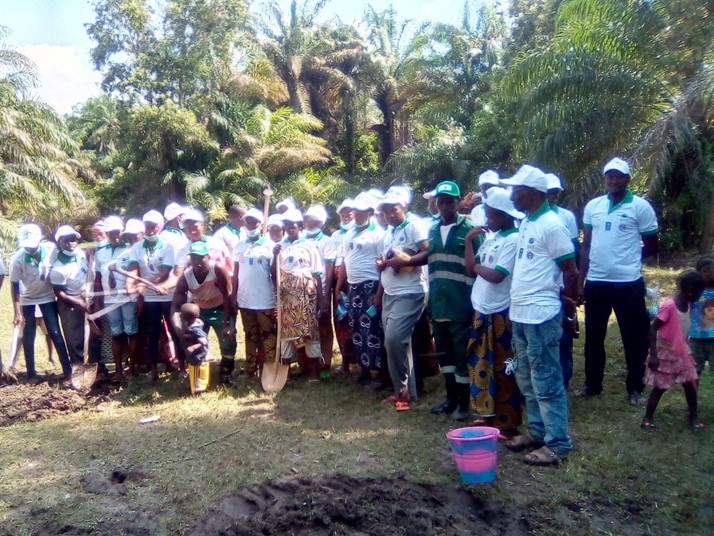
The Touguissoury community at the launch of horticulture activities © Souleymane Diallo
Groupement pour la protection de l’environnement et le développement local de Touguissoury
Country: Guinea
Type: Local community organisation
Ecosystem: Terrestrial (Forest), Marine (Mangrove)
Groupement pour la Protection de l’Environnement et le Développement Local de Touguissoury was created by the community of the Touguissoury Island with the support of District and Khorira rural commune authorities. Its main objective is to sustainably manage their natural resources while addressing food and nutritional security for households. In their territory of life, the sacred natural site is the centre of the community’s traditional practices. Particularly respected and protected, it symbolises the cultural and spiritual values of the community. Harbouring a wealth of biodiversity, certain aquatic and terrestrial species considered to be their doubles (totems) are protected and the access to and exploitation of certain fundamental natural resources is regulated.
Recommended by Salatou Sambou, ICCA Consortium Honorary member and Regional Coordinator for West Africa
Association pour la Promotion de la Paix, l’Environnement et le Genre (APPEG)
Country: Guinea
Type: Civil Society Organisation- national
Ecosystem: Terrestrial (Forest)
APPEG’s work focuses on environmental conservation in general and ICCAs in particular as a means to improving the living conditions of rural communities and to strengthening their role as key players in sustainable socio-economic development. Altogether with the promotion of peace and gender equality, the organisation has carried out nine projects in the country, focusing on biodiversity conservation, climate change, soil degradation and sustainable forest management, capacity building and awareness-raising among the beneficiary communities of the need to conserve their territories of life.
Recommended by REGUIZOH,
ICCA Consortium Member
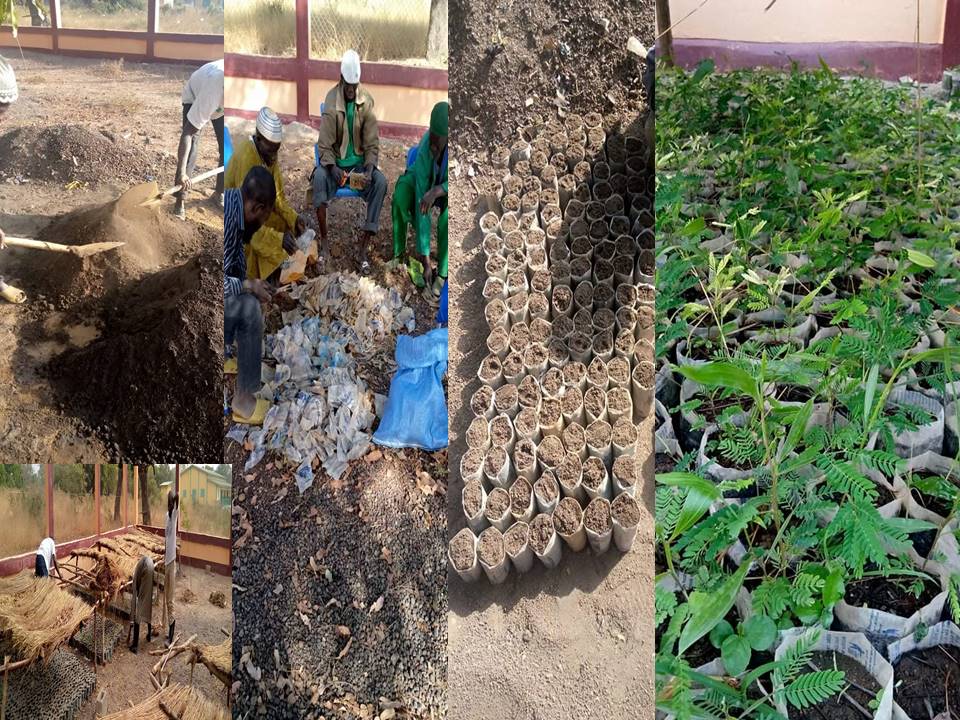
Installation of the nursery for the restoration of the APAC in Balato © APPEG
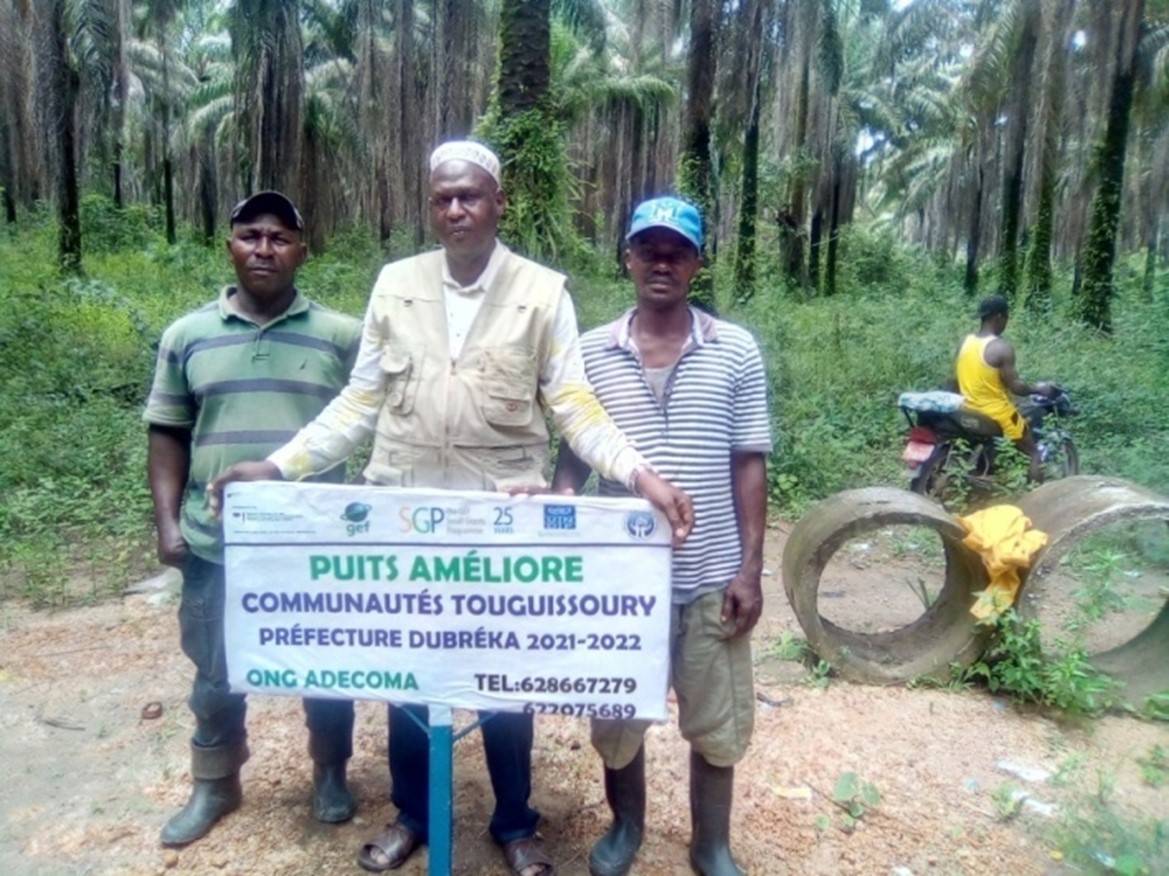
Improved wells in Gadha Koubaya to supply water to the camps © Souleymane Diallo
ONG Assistance Pour le Développement Communautaire et Associatif (ADECOMA)
Country: Guinea
Type: Civil society organisation – national
Ecosystem: Marine (Mangroves, estuaries, coastal areas)
The work of ADECOMA focuses on promoting research to find the most appropriate ways of meeting the real needs of decentralised communities, cooperatives and groups in the domains of food, environment, housing, health, communications, training and employment, among others. All in a framework of freedom, equality, solidarity and justice, ADECOMA’s support for ICCAs is reflected in the re-qualification of ancestral knowledge and know-how in the use and conservation of biodiversity, and the enhancement of traditional beliefs and all other associated forms of expression of local culture, including history, proverbs, rituals and customary rights.
Recommended by REGUIZOH,
ICCA Consortium Member
Ligue Guinéenne pour la Nature
Country: Guinea
Type: Civil society organisation – local/regional/national/ international (continental)
Ecosystem: Terrestrial (Forest, savanna), Marine, Freshwater
In 2006, the organisation began operating on an informal basis to support local communities in asserting their rights around nationally recognised protected areas, as well as those with an international label, in particular, to secure recognition of their subsistence hunting rights and their ownership rights over their forests, water sources and sacred ponds. The overall objective of Ligue Guinéenne pour la Nature is to actively support national, regional and international efforts to preserve, protect, restore and rationally use Nature’s resources for people’s well-being, from a sustainability perspective. It has been involved in identifying ICCAs and supporting the operation and legal recognition of some of them in the ecosystems covered.
Recommended by Salatou Sambou, ICCA Consortium Honorary member and Regional Coordinator for West Africa
Madagascar and the Indian Ocean islands
ONG FANONGA FOKONOLONA
Country: Madagascar
Type: Civil society organisation – local/regional/national/international
Ecosystem: Terrestrial, Marine
ONG FANONGA FOKONOLONA is a platform for exchange and strategic and technical support for improving the living conditions, autonomy (selfdetermination) and resilience of local communities in Madagascar. The organisation supports advocacy activities for the recognition of Fokonolona governance of common heritage and territories of life, supports the establishment of communication channels between communities throughout the island and international exchanges between communities and practitioners, and actively contributes to the promotion of sustainable livelihoods and cooperatives for food sovereignty.
Recommended by TAFO MIHAAVO,
ICCA Consortium Member

FANONGA FOKONOLONA with local communities © FANONGA FOKONOLONA
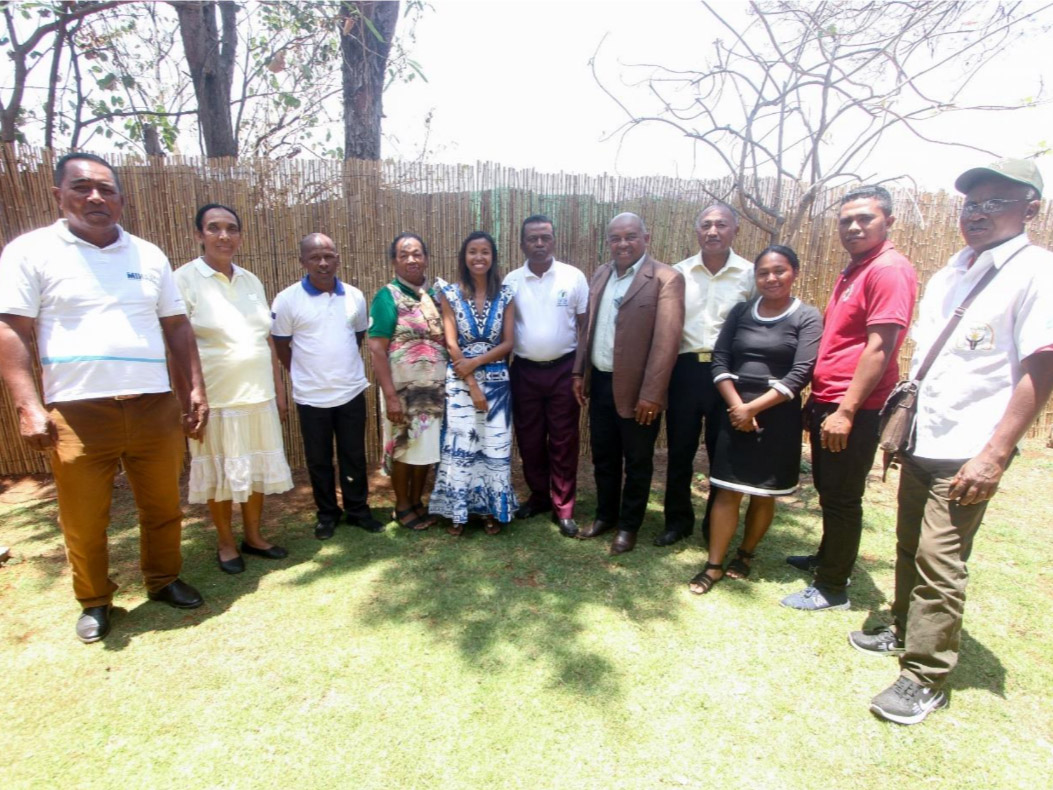
Meeting with all the representatives of community associations in Madagascar, including: TAFO MIHAVO, Coalitions des Paysans Madagascar, TRANOBEN’NY TANTSAHA, KOLOHARENA and MIHARI © Beolobe
Beolobe
Country: Madagascar
Type: Civil society organisation – local/national
Ecosystem: Terrestrial (Forest), Marine
Beolobe is an initiative focused on upholding and supporting ICCAs as the first non-profit local trust fund in the form of a social enterprise which directly involves is bona-fide caretakers. It dedicates to promote their human rights, livelihoods and socio-economic well-being to ensure its contribution to a green and blue sustainable economy and works to strengthen the governance, management, and recognition of these areas. This often involves providing technical assistance, capacity building, advocacy, and facilitating partnerships to ensure ICCAs sustainable conservation and management.
Recommended by MIHARI Network,
ICCA Consortium Member
The 2019 General Assembly, Udaipur, India (c) ICCA Consortium
ASIA
West and Central Asia and the Caucasus
Organization for Community and Humanitarian Assistance (OCHA)
Country: Afghanistan
Type: Civil Society Organisation – local/national
Ecosystem: Terrestrial (Forest), Freshwater
OCHA is a grassroots organisation, the core mission of which is to improve the wellbeing of people experiencing poverty and vulnerability in the country through humanitarian support and by creating, providing and promoting opportunities to improve their livelihoods, alongside with adaptation of climate changes and environmental protection. In partnership with UNDP-SGP and with the support of Gujar, Sawoji and Kurangali Indigenous communities, OCHA is currently focused on biodiversity restoration of wild trout in the Dare-Peaj River to conserve and restore the species and prevent its decline and depletion due to illegal practices.
Recommended by Green Environment and Development Organization (GREDO), ICCA Consortium Member
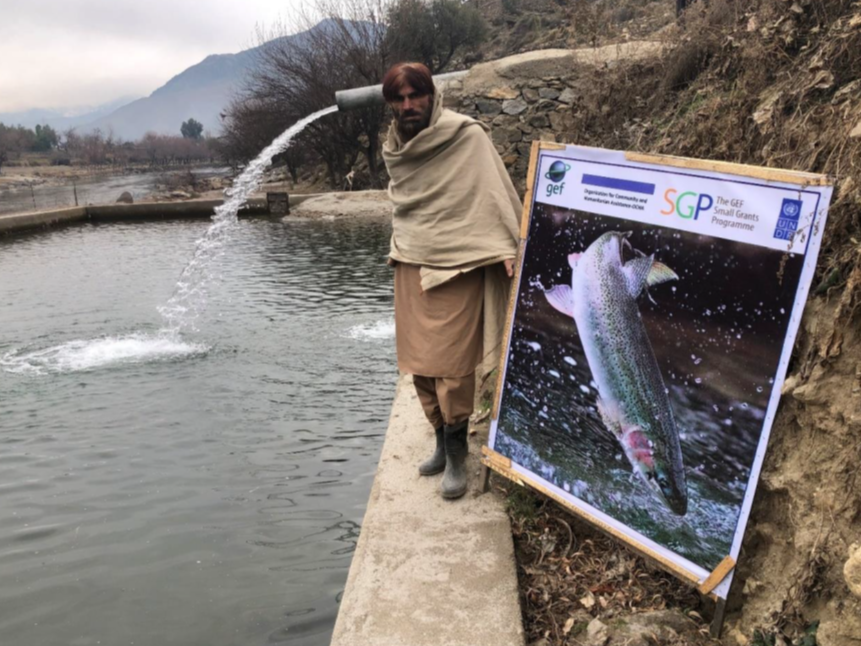
Enhancing biodiversity restoration of trout fish initiative © OCHA
Southeast Asia
Building Initiatives in Indigenous Heritage (BIIH)
Country: Malaysia
Type: Indigenous organisation – local
Ecosystem: Terrestrial (Forest), Freshwater (Rivers)
BIIH’s mission is to strengthen Indigenous communities to initiate ways to protect, rejuvenate, utilise and promote heritage and traditional knowledge to support sustainable livelihoods and community-based forest management. For over two decades, BIIH has supported ritual revitalisation through direct financing the Bidayuh community and neighboring
communities in West Kalimantan, Indonesian Borneo. Other activities include river rehabilitation, documenting of Jagoi intangible heritage and support for sustainable ecotourism activities where requested as an alternative economic livelihood that sustains and nourishes the local environment within the communities’ environment.
Recommended by Partners of Community Organisations (PACOS) Trust, ICCA Consortium Member
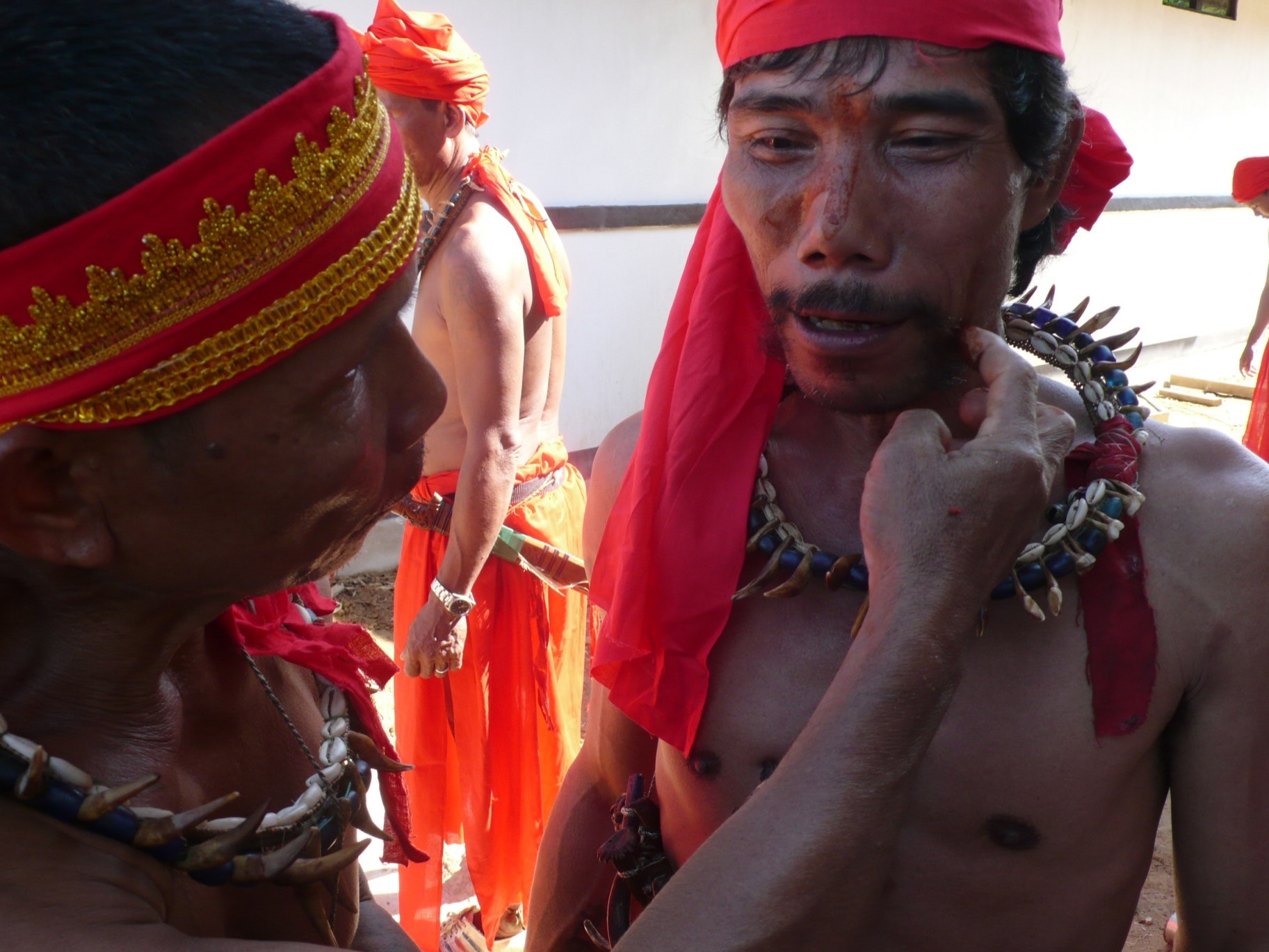
Bidayuh kin separated by colonial borders come together to celebrate the skull-blessing ritual (Gawea Nyobang) © BIIH
Mat-l Man-ibay Civoleg Langguyod (Mamacila) Higaunon Tribal Community
Country: The Philippines
Type: Indigenous organisation (federation) – local
Ecosystem: Terrestrial (Forest)
The organisation was formed in the 1990s with the vision to unify the four adjoining Higanoun Indigenous communities in the localities of Claveria and Gingoog in Northern Mindanao: Mat-I, Mai-ibay, Civoleg and Langguyod. As a result, the cultural integrity of their shared ancestral domain would be guaranteed. In 2009, they were issued with a Certificate of Ancestral Domain Title which extended to 17,677.68 hectares in 2022 after jointly self-declaring a shared ICCA within the Mt. Sumagaya and Kimangkli, which they consider as their Pina daw Bahaw-bahaw, their place of worship, sacred site, hunting ground and the area where we gather a number of forest products for subsistence and livelihoods.
Recommended by NTFP-EP, ICCA Consortium Member
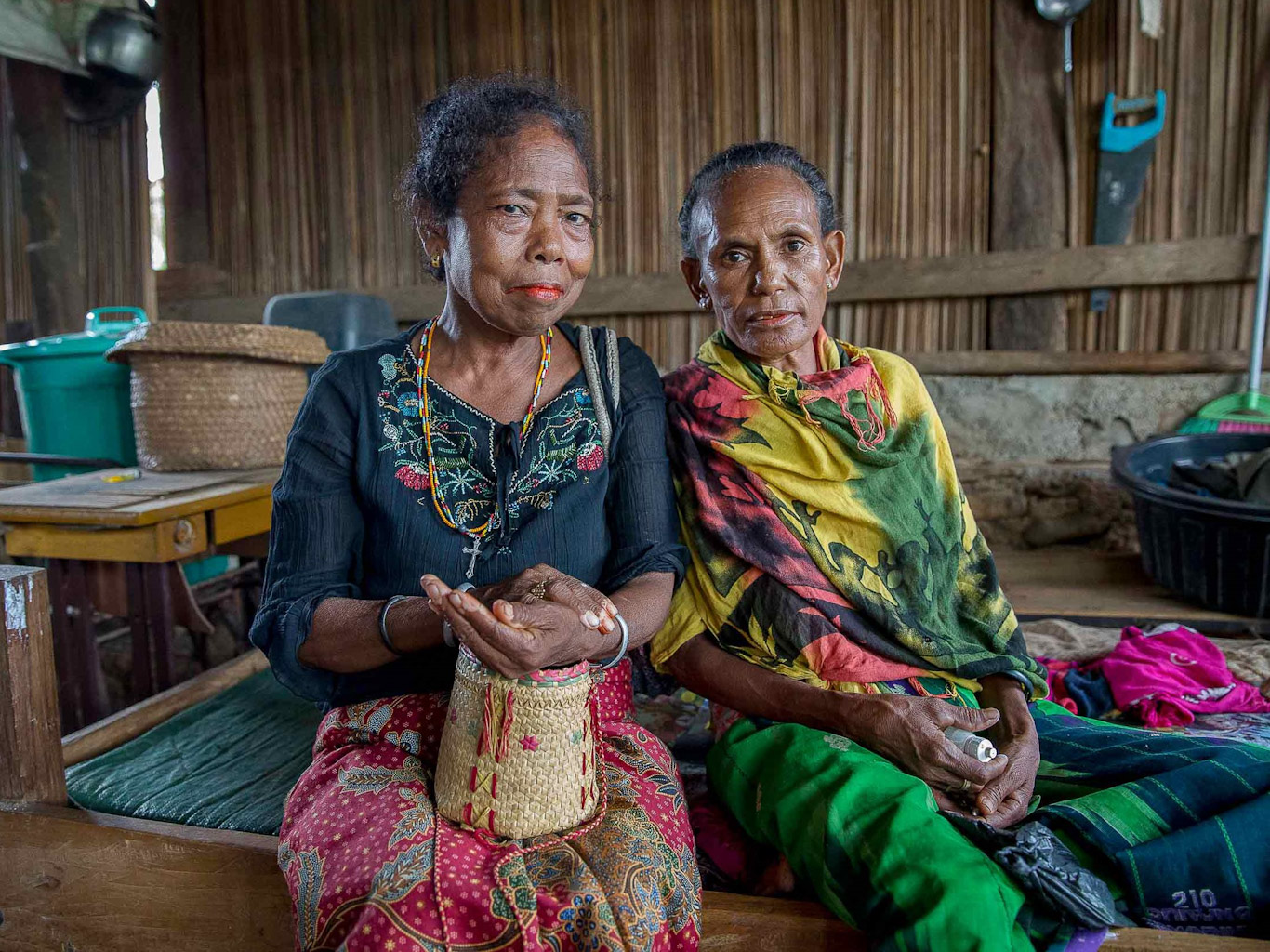
Women and their businesses
© Anne Carlile
Fundasaun Haburas Moris (FHM)
Country: Timor-Leste
Type: Non-governmental organisation – local
Ecosystem: Terrestrial (Forest)
Meaning ‘to develop life’, Haburas Moris is a local NGO who fosters sustainable development at a grassroots level in the rural district of Bobonaro in Timor-Leste. Founded by a Tetum-Kamak-Bunak woman, for more than 20 years Haburas Moris has supported women’s voice in rural Maliana, to improve their livelihood and economic power by providing skills and resources which have resulted in successful micro businesses and women-led cooperatives and saving groups. Other key activities of the organisation, aimed at revitalising local leadership and especially that of women in relation to natural resource management, is the planting of rice and vegetables as the basis of a livelihood improvement project, the establishment of an agro-demo farm and the creation of a farmers’ group to support local economic activity as well as ecosystem conservation.
Recommended by June Rubis, ICCA Consortium Honorary member and Thematic co-representative for Documenting territories of life.
East and North Asia
Qingdao Marine Conservation Society (QMCS)
Country: China
Type: Civil Society Organisation – local/national
Ecosystem: Marine
QMCS is an environmental NGO based in the coastal city of Qingdao. Its mission is “To promote coastal and marine ecosystem conservation and drive the sustainable seafood movement through scientific research, public and industry education, and international exchange of knowledge and experience”. The three pillars of its core functions are sustainable fishery and aquaculture development, marine and coastal habitat conservation and sustainable seafood education. The organisation has focused on empowering fishing communities dependent on oyster reefs, seagrass beds, and intertidal mudflats at various locations to better co-manage these critical marine habitats by integrating science-based solutions with traditional ecological and cultural wisdom. Some examples include collaborative sample gathering to better understand local marine resources and the ecosystems’ biodiversity and publication of awareness-raising fishing stories and experiences on social media about traditional fishing practices. Also, along with partners, QMCS has been exploring ways to mitigate the pressure on Langya’s coastal marine habitat, as well as providing capacity-building opportunities. Recently, it has been developing a systematic environmental education course for primary school students (most of them descendants of local fishers), focusing on local marine biodiversity and traditional fishing culture.
Recommended by Shan Shui Conservation Center, ICCA Consortium Member
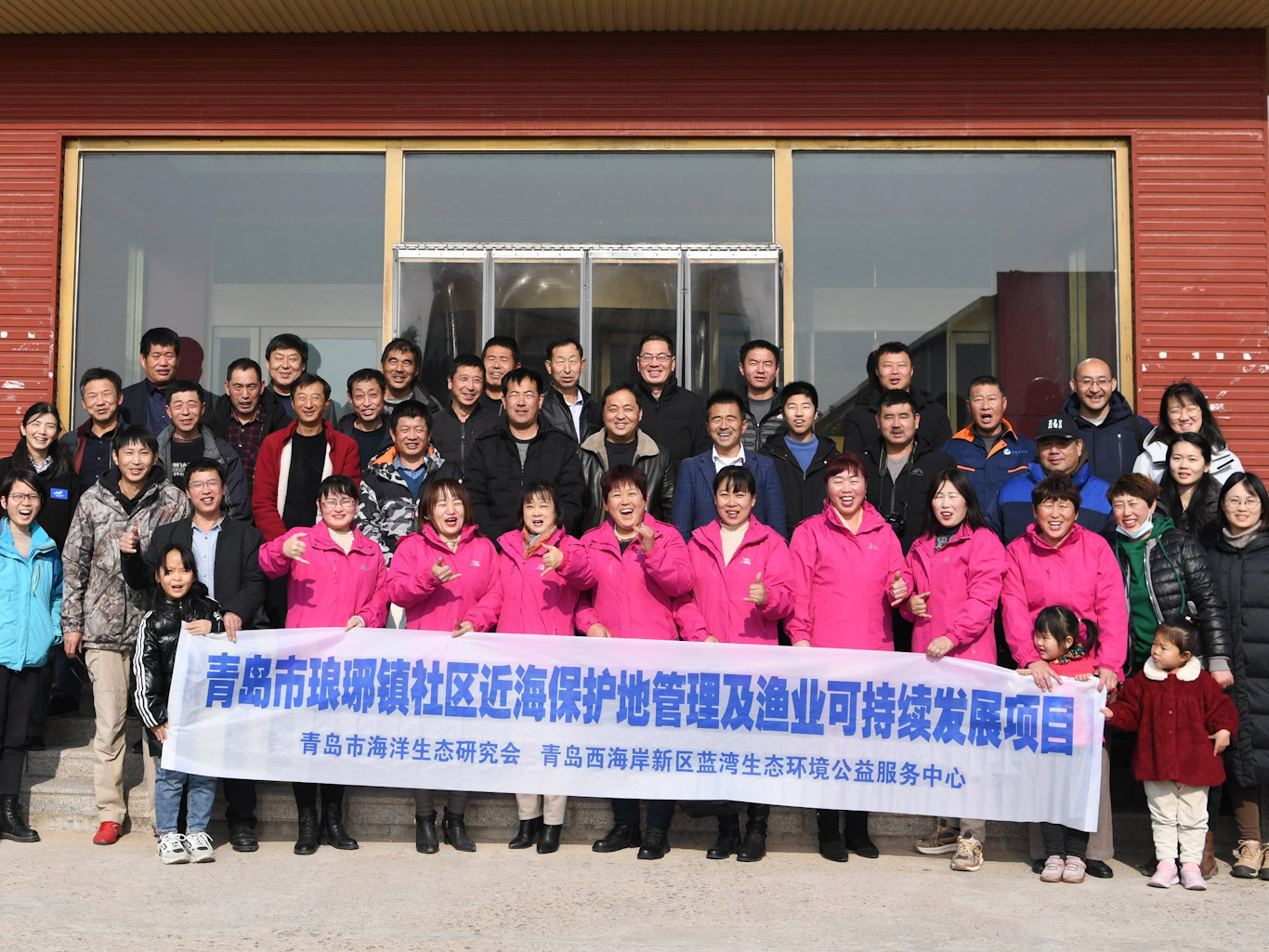
Second fisher training session in Langya Township © QMCS
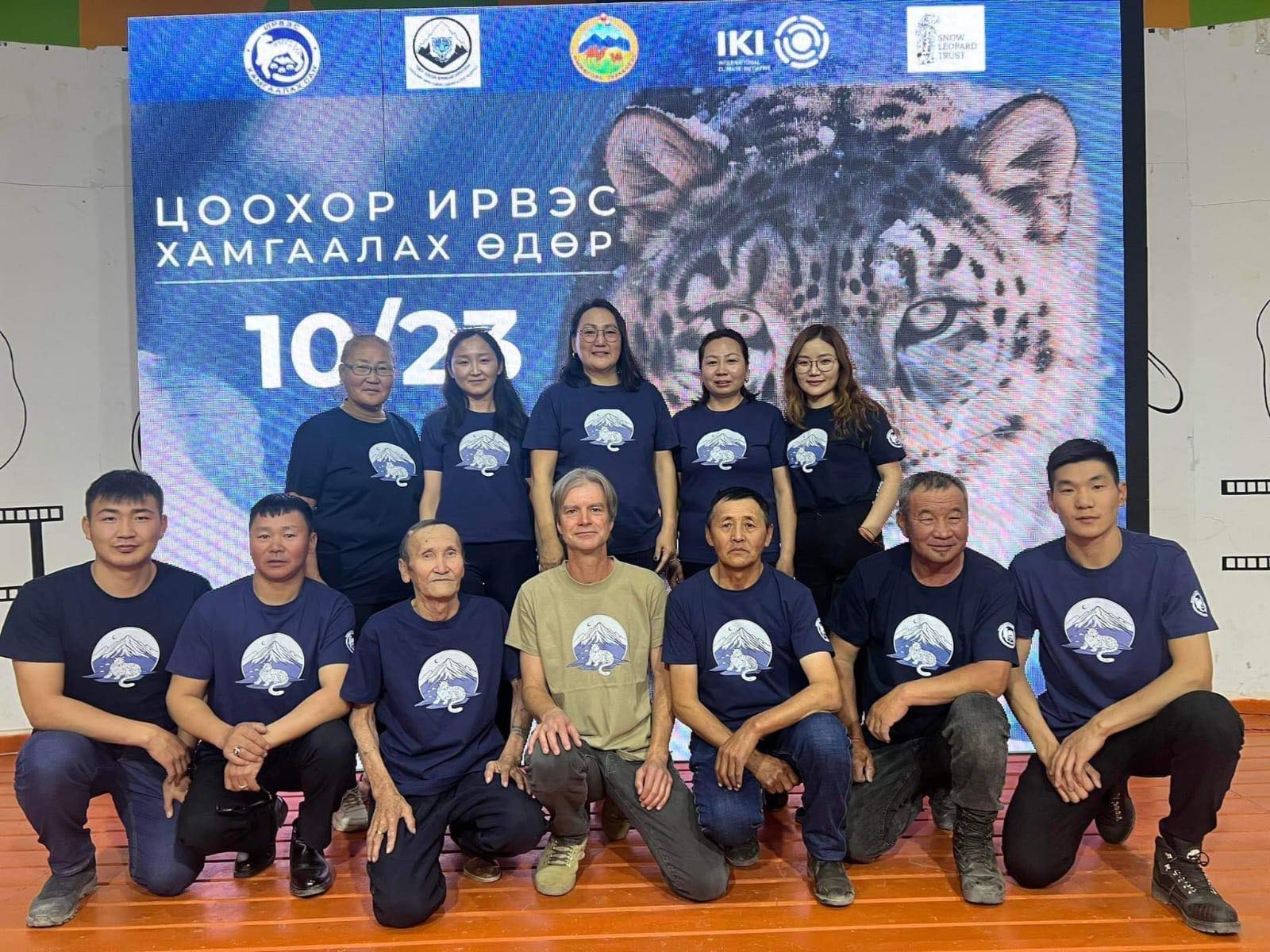
Organisation photo
© SLCF
Snow Leopard Conservation Foundation (SLCF)
Country: Mongolia
Type: Civil Society Organisation – national
Ecosystem: Terrestrial (Mountain)
SLCF extensively works with more than 30 Indigenous communities in Western and Southern Mongolia living in mountain landscapes. Since its inception, the organisation has run community-based research and conservation programs throughout the snow leopard range, including 7 provinces and 17 counties with the participation of 33 communities. Through years of grassroots organising with local and Indigenous herder communities and community-supported research, it has had remarkable success securing and operationalising protection for the snow leopard habitat, managing human-wildlife issues and bringing benefits to local people.
Recommended by Shan Shui Conservation Center, ICCA Consortium Member
The 2019 General Assembly, Udaipur, India (c) ICCA Consortium
